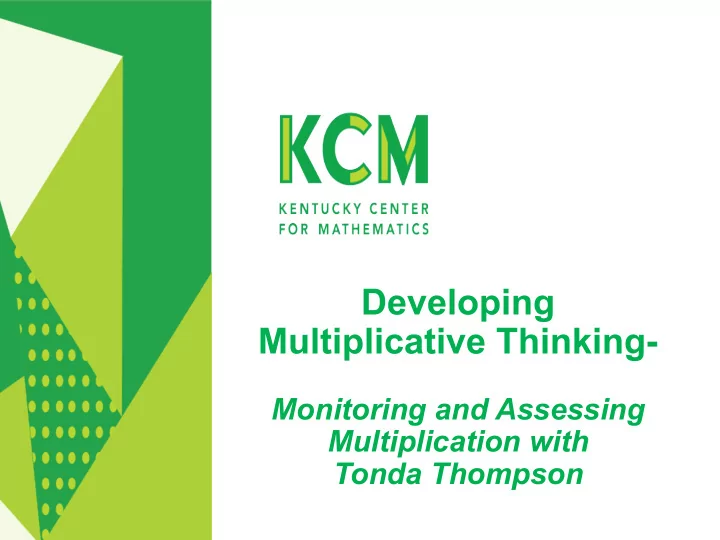

Developing Multiplicative Thinking- Monitoring and Assessing Multiplication with Tonda Thompson
KCM Website www.kentuckymathematics.org
Welcome! Your host Tonda Thompson Regional Consultant Kentucky Center for Mathematics tonda.thompson@grrec.org
My Educational Experience Classroom teacher for 16 years MIT for 11 years (MAF-2006-2017) KCM - since 2006 Math Recovery - 2006-2017 Teacher learner - FOREVER
Agenda *Research *Standards *Major categories of assessment *6 types of formative assessments *Observations *Interviews *Progress monitoring
This work comes from the following books:
So why do we assess students in mathematics? To enhance students learning For making instructional decisions To provide feedback to help learners progress Van de Walle, Karp, Lovin, Bay-Williams; Teachering Student-Centered Mathematics, Volume II Grades 3-5
Assessments fall into one of two major categories: Summative Assessments - Cumulative evaluations that take place usually after instruction is completed. They commonly generate a single score, such as an end-of-unit test or a standardized test that is used in your state or school district. Formative Assessments - assessments used to check students development during instructional activities, to pre-assess, or to attempt to identify students understandings or misconceptions. Van de Walle, Karp, Lovin, Bay-Williams; Teachering Student-Centered Mathematics, Volume II Grades 3-5
6 TYPES OF FORMATIVE ASSESSMENTS: 1. Observations 2. Questions 3. Interviews 4. Tasks 5. Students’ Self-Assessment and Reflection 6. Rubrics Teaching Student-Centered Mathematics; Vol. II; Grades 3-5
OBSERVATIONS During the observation, 2 valuable results occur: 1. Information that may have gone unnoticed is suddenly visible and important 2. Observation data gathered systematically can be combined with other data fused in planning lessons, providing feedback to students, conducting parent conferences and determining grades. Van de Walle, Karp, Lovin, Bay-Williams; Teachering Student-Centered Mathematics, Volume II Grades 3-5
ANECDOTAL NOTES (Observations) The act of professional noticing where you observe learners through a focus on 3 phases: 1. Attending: if the child nods head, uses fingers to count, etc. 2. Interpreting: students gestures, comments, drawings and actions by making notes of possible strengths and the level of sophistication of their conceptual understanding. 3. Deciding: Where to go next with instructional actions. Van de Walle, Karp, Lovin, Bay-Williams; Teachering Student-Centered Mathematics, Volume II Grades 3-5
CHECKLIST (Observations) To help focus your attention, a checklist with several specific processes, mathematical practices, or content objectives can be devised OR Checklist that involves listing all students in a class on one to three pages. Across the top of the page are specific abilities or common misconceptions to look for, possibly based on learning progression. Van de Walle, Karp, Lovin, Bay-Williams; Teachering Student-Centered Mathematics, Volume II Grades 3-5
Checklist
Observation Tool: Multiplication Strategy/Foundational Facts Sets
Observations and Anecdotal Records https://youtu.be/ed9EqWXO4Jg
Questions 2. Questions: Probing students thinking through questioning can provide better data and more insights to inform instructional next steps. Have high level questions on a tablet or in print as you move about the classroom to prompt and probe students thinking. Van de Walle, Karp, Lovin, Bay-Williams; Teachering Student-Centered Mathematics, Volume II Grades 3-5
Interviews I nterviews, particularly diagnostic interviews, are a means of getting in-depth information about a child’s knowledge of concepts and strategy use to provide needed navigation. The diagnostic interview is usually a one-on-one investigation of a child’s thinking about a particular concept, process, or mathematical practice that lasts from 3-10 minutes. Van de Walle, Karp, Lovin, Bay-Williams; Teachering Student-Centered Mathematics, Volume II Grades 3-5
Let’s practice an Interview https://youtu.be/EOIt5sN1J3c
Where can I find Interview assessment screeners for Multiplication https://sites.google.com/site/mathscreeners/home/number-sense-scre eners BVSD Math Screeners
Tasks Problem-Based Tasks: tasks that are connected to actual problem-solving activities used in instruction. High-quality tasks permit every child to demonstrate his or her abilities Ex: Write a multiplication problem that has a product that falls between the answers to these two problems: 49X25 and 45X30. Write an explanation of how you came up with your solutio n. Translation Tasks: Write a word problem that matches the equation. Illustrate the equation with materials or drawings
Writing: As an assessment tool, writing in journals, exit slips, or other formats provide a unique window to students perceptions and the way they are thinking about an idea. ”I think the answer is… I think this because….. Explain to a student who was absent today what you learned about multiplication. If you got stuck today in solving a problem, where in the problem did you have trouble?
Students self-assessment and reflection Discussions of how students can improve when they analyze their own mistakes. How well do you think you understand the work we have been doing in multiplication of a two-digit number by a one-digit number? Which problem(s) on the activity sheet did you find most challenging? Which were easiest?
Rubrics A rubric is a scale based on predetermined criteria with two important functions: (1) It permits students to see what is central to excellent performance, and (2) it provides you with scoring guidelines that support equitable analysis of students work.
Now what, after assessment?
MULTIPLICATION AND DIVISION PROGRESS MONITORING
Upcoming Sessions
Follow Us! www.kentuckymathematics.org @KyCenterforMath @KyMath
Thank you for your time Tonda Thompson tonda.thompson@grrec.org
Recommend
More recommend